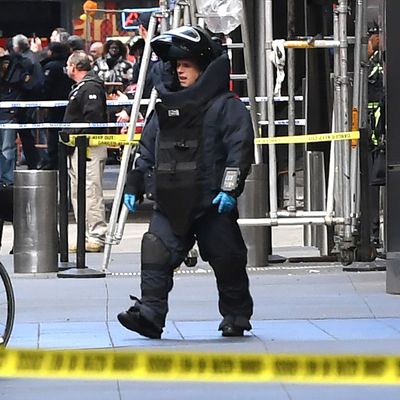
We are just two weeks away from a close, high-stakes midterm election that could well determine the power — and foreshadow the fate — of a Trump presidency that almost everyone in both parties considers a momentous development in American politics. The temperature level among the political elites and among activists of the left and right across the country is reaching a fever point. And so the news of explosive devices being sent to the homes of Barack Obama, Hillary Clinton, George Soros, and CNN, shocking as it is, feels like a predictable lurch into madness in a country already half-crazed by political conflict.
It’s not even new. Days ago, a former member of the military was arrested for mailing ricin to the White House and other Trump administration officials. Last year, a gunman opened fire on GOP members of Congress while they were practicing for a softball game, nearly killing Representative Steve Scalise.
As a background to all this, consider how thoroughly the language of military conflict has taken over our political discourse. Voters are being “mobilized.” Resources are being “deployed” to “battleground states” where key races are “targeted” for “strategic strikes” via attack ads “launched” by political field marshals in some distant headquarters. Guerrilla warfare is undertaken by “dark ops” specialists utilizing social media and whisper networks. More than ever, opponents are enemies, and partisans are constantly warned against compromise and enjoined to be tough and merciless, and above all to avoid the weak moralism of “unilateral disarmament” and keep maniacally focused on the “conquest” of House and Senate seats.
We all have our theories of why politics increasingly feels like combat, and who is primarily to blame for the creeping savagery of political rhetoric. Back in 2011, when the tea party movement and its quasi-totalitarian ideology of Constitutional Conservatism appeared to be introducing a new and unforgiving tone in politics, two colleagues and I at The Democratic Strategist website published a memo deploring “politics as warfare,” and noting its ubiquity in the extremist politics of the left and right in other countries.
* In the politics as warfare perspective standard norms of honesty are irrelevant. Lying and the use of false propaganda are considered necessary and acceptable. The “truth” is what serves to advance the party’s objectives.
*In the politics as warfare perspective the political party accepts no responsibility for stability—engineering the fall of the existing government is absolutely paramount and any negative consequences that may occur in the process represent a kind of “collateral damage” that is inevitable in warfare.
* In the politics as warfare perspective the creation of contrived “incidents” or deliberate provocations are acceptable. Because the adherent of this view “knows” that his or her opponents are fundamentally evil, even concocted or staged incidents are still morally and ethically “true.” The distinction between facts and distortions disappears.
* In the politics as warfare perspective compromise represents both betrayal and capitulation. Destruction of the enemy is the only acceptable objective. People who advocate compromise are themselves enemies.
In writing those lines, we were thinking of the tea party extremists. But since then “politics as warfare” has become common on both sides of the partisan and ideological barricades. During the Trump administration, it has become the norm rather than the exception, from crude and violent presidential tweets to a #Resistance that often views itself as the last bulwark against fascism. I am not assessing degrees of blame or trying to assign “equivalence” between left and right. At the moment, the right holds political power in a tight grip (perhaps not so tight after November 6), while the left continues to debate whether emulating the “enemy’s” behavior is essential to self-defense or instead plays into a demagogue’s hands.
Putting aside blame, however, if political rhetoric in this country continues on its current trajectory, people are going to start getting killed, and then inevitably, the violence will escalate. Perhaps last year’s shootings at the congressional baseball game and today’s apparent assassination attempts on the Clintons and Obamas were the isolated acts of deranged individuals. But with many thousands of people distraught and despairing over politics in a nation as heavily armed as ours, the metaphorical “mobilization” already under way could become literal more easily than we might normally imagine. And in the end, the reduction of politics to a pure power struggle with no quarter granted is likely to be won by those who already hold power.
So let’s try to get a grip and recognize that while the stakes of this and upcoming elections are indeed high and that passionate commitment to politics is an act of civic patriotism, this is not the Spanish Civil War and we should not treat our fellow citizens as cannon fodder or proper objects for a firing squad. Let’s “demobilize” our rhetoric, please, before it becomes prophetic.






























